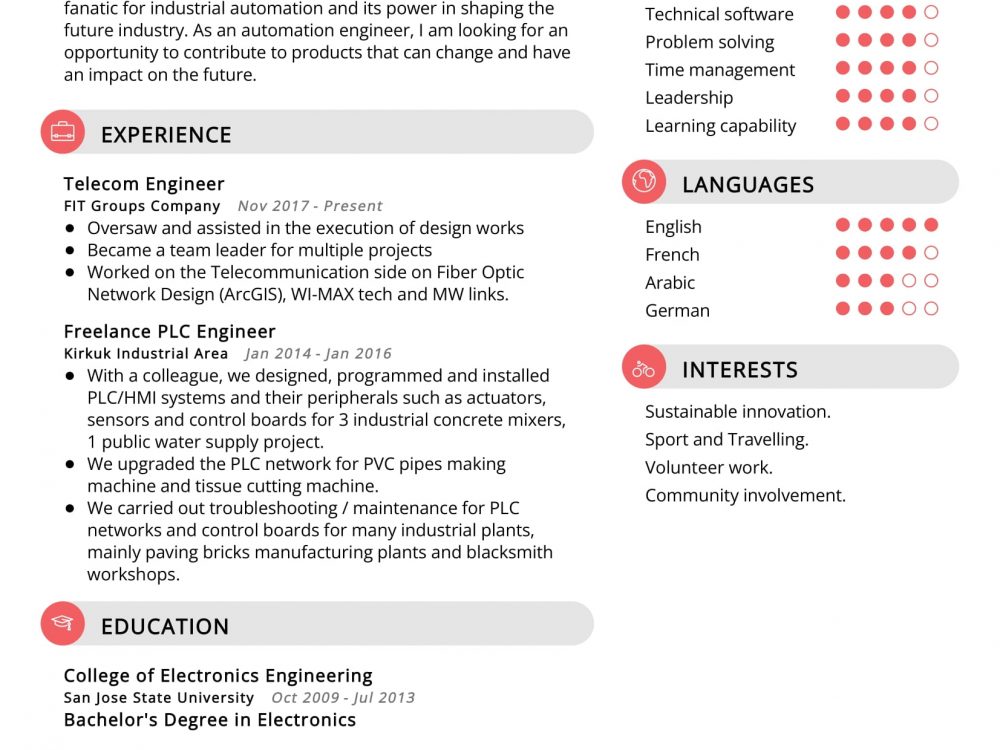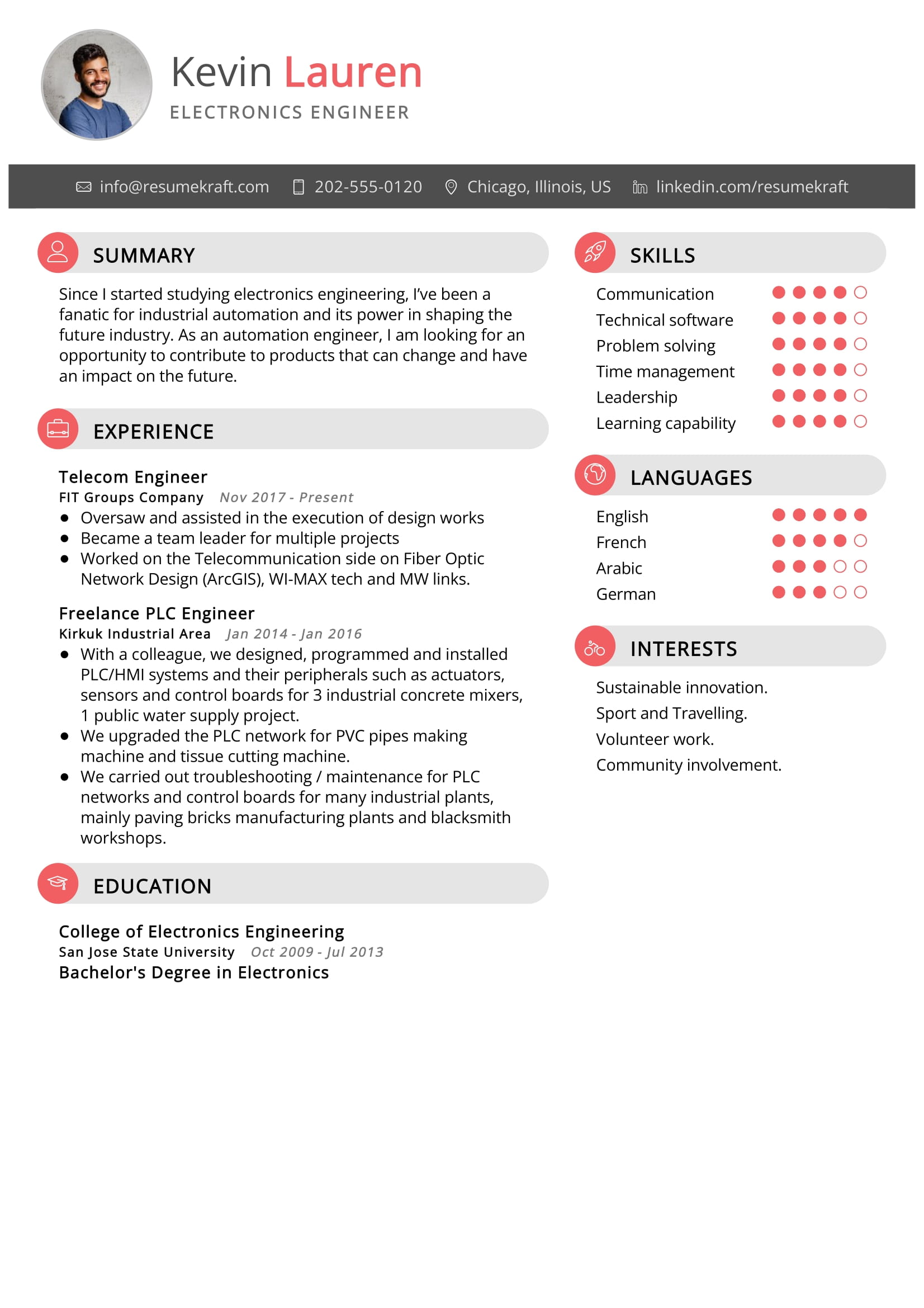What Should Be Included In A Electronics Engineer Resume?
An effective resume is essential for any job seeker, especially when applying for a position as an electronics engineer. This type of professional requires a combination of technical knowledge and real-world experience, and the resume must accurately reflect this. In order to ensure that your resume stands out, it is important to include certain information that clearly displays the qualifications and experience that you possess.
When creating an electronics engineer resume, the most important thing to include is a summary of qualifications. This should be a brief but comprehensive overview of the skills and experiences that you can bring to the position. The summary should be tailored to the specific job and company you are applying for, and should be no longer than 4-5 sentences.
In addition, it is essential to include a list of technical skills related to electronics engineering. This list should include specific software and hardware programs and technologies that you are knowledgeable about, as well as any technical certifications or licenses held.
It is also important to include a detailed work history, which should include previous positions held, the companies you worked for, and a brief description of your role in each position. Be sure to include your accomplishments, as this will demonstrate how you have added value to past employers.
Finally, it is helpful to include a section dedicated to professional development and education. This should include any additional coursework or training you have completed, as well as any industry-related conferences or workshops you have attended.
By including all of this information in your electronics engineer resume, you can be sure that you will stand out from the competition and have the best chance of being called for an interview.
What Skills Should I Put On My Resume For Electronics Engineer?
Writing a resume for any engineering position is a daunting task, especially if you are a Electronics Engineer. You need to make sure that your resume stands out from the rest and shows your expertise in the field of electronics engineering. The key to success is to highlight the most important skills that you possess and make sure to showcase them in your resume.
When writing a resume as an Electronics Engineer, you should include skills related to designing and developing electronic equipment, analyzing and interpreting data, programming, and troubleshooting. Additionally, it’s important to discuss your knowledge of electronic control systems, circuit analysis, and signal processing.
You should also highlight any experience you have that demonstrates your technical capabilities. This includes any research or development projects you’ve been involved in, as well as any software or hardware design projects. Make sure to include any relevant coursework you have taken and your understanding of industry standards and protocols.
Communication and leadership skills are also key for any engineer. Your resume should reflect your ability to work in a team and your understanding of the project at hand. You should also mention your problem-solving skills and any experience you have with troubleshooting.
Finally, make sure to emphasize your commitment to safety and quality assurance procedures. You should also include any certifications you have received that are related to electronics engineering. With the right skills highlighted, your resume will reflect your expertise in the field and make you stand out from the competition.
What Is The Job Description Of The Electronics Engineer?
An electronics engineer is a highly specialized technical professional responsible for designing, developing, testing, and manufacturing electrical and electronic components and systems. They are also responsible for ensuring that these components and systems are safe, effective, and reliable. Electronics engineers work with a variety of different types of equipment and materials, such as transistors, resistors, capacitors, and integrated circuits.
The job of an electronics engineer requires a wide range of skills and knowledge. They must understand the principles of electricity, electronics, and electromagnetism, as well as have a good working knowledge of computer programming. Electronics engineers must also be able to diagnose and troubleshoot problems in electronic systems and be able to develop innovative solutions to address these issues. In addition, they must also be able to design, build, and test new electronic components and systems.
In order for electronics engineers to be successful in their profession, they must have excellent communication skills, problem-solving abilities, and the ability to work well with a team. Additionally, they must possess strong analytical and mathematical skills, as well as a comprehensive understanding of engineering principles and practices. To be successful in this field, it is also important for electronics engineers to keep up on the latest advancements in technology and be able to apply these advancements to their work.
Being an electronics engineer requires a lot of hard work, dedication, and knowledge. It is a highly rewarding and challenging field, and those who pursue a career in this field will find a world of opportunities awaiting them. With the right qualifications and experience, an electronics engineer can become a successful and respected leader in their field.
What Is A Good Objective For A Electronics Engineer Resume?
When writing a resume for an electronics engineer position, crafting a professional and appealing objective statement is essential to making a good first impression. A strong objective should be concise and succinct and should emphasize the job seekers’ competencies and qualifications. It should also reflect the unique demands of the job and the goals of the employer.
A good objective for an electronics engineer resume should highlight the applicant’s technical knowledge and experience in the field. It should also emphasize the applicant’s ability to use problem-solving and communication skills to identify and resolve electronics engineering issues. Additionally, the objective should indicate the applicant’s commitment to safety and quality standards and their willingness to work as part of a team.
A well-crafted objective statement should also reflect the applicant’s past successes in the field and any special skills or qualifications that are relevant to the position. It is important to keep the objective statement brief and to the point, as too many details can detract from the overall message. Finally, the statement should be tailored to the specific employer and job in question, as this will make it more likely to be noticed and considered by hiring managers.
What Are The Career Prospects In The Electronics Engineer?
Electronics engineering is an ever-expanding field, with numerous opportunities for career advancement. With the increase in demand for consumer electronics and the growing need for highly skilled engineers, the job market for electronics engineers is booming. As an electronics engineer, you can expect to work on a variety of projects and develop new technologies, products, and systems. You may design and build a variety of electronic systems, including computer networks, medical equipment, and digital equipment. You may also be responsible for the maintenance, repair, or upgrading of existing systems. As an electronics engineer, you can expect to be well-compensated for your expertise and experience.
With the demand for electronics engineers on the rise, there are many career options available. From designing and building new systems to troubleshooting and repairing existing ones, the possibilities are endless. You may find yourself working in a variety of industries, including telecommunications, semiconductor manufacturing, automotive, and consumer electronics. You can even specialize in more specific areas of electronics engineering, such as embedded systems or Internet of Things (IoT) technologies.
In addition to traditional engineering roles, you may also have the opportunity to pursue research and development (R&D) jobs. These positions require a great deal of technical knowledge and problem-solving skills, as you will be responsible for researching new technologies and creating prototypes. You may also be involved in developing software to improve the efficiency and reliability of existing systems.
Overall, the career prospects in the electronics engineering field are bright. With the increasing demand for new products and systems, and the development of new technologies, the job market for electronics engineers is expected to remain strong in the coming years. As an electronics engineer, you will have the opportunity to work on a variety of projects, from new product development to troubleshooting and repairing existing systems. You will be involved in developing software to improve the efficiency and reliability of existing systems, as well as creating new ones. Additionally, you will be responsible for designing and testing components and systems, and may also be responsible for managing projects and resources. With the combination of technical and analytical skills required for the job, your career prospects are sure to be promising.
Key Takeaways for an Electronics Engineer resume
When writing a resume as an Electronics Engineer, there are several key takeaways that should be kept in mind. First, it is important to showcase any technical skills or certifications that the candidate may possess. This could include knowledge of specific software, hardware, or programming languages. Additionally, it is essential to highlight any achievements or awards that may have been earned during the candidate’s professional career. These could include recognition from employers or any awards won in industry associations or competitions.
Another important takeaway is to ensure that any relevant educational qualifications are included in the resume. Gaining an Electronics Engineering degree or certificate can be an impressive addition to the candidate’s credentials and should be showcased, if applicable. Additionally, any relevant internships or apprenticeship experience should be listed, as this can provide valuable insight into the candidate’s abilities and skillset.
It is important for job seekers to ensure that when crafting their resume, any relevant educational qualifications related to the job they are applying for are included. Gaining an Electronics Engineering degree or certificate can demonstrate technical ability and provide a competitive edge to the candidate’s application. Furthermore, any internships or apprenticeships the candidate has had should be listed as this can provide an indication of their knowledge and capabilities within the field. Additionally, it is also beneficial to list any other qualifications or certifications related to the
Finally, it is important to include any relevant volunteering experience or extra-curricular activities that the candidate may have taken part in. This could provide potential employers with a more holistic view of the candidate and also demonstrate their commitment to the industry. Overall, focusing on these key takeaways can help create an impressive Electronics Engineering resume that will help applicants stand out amongst their peers.


